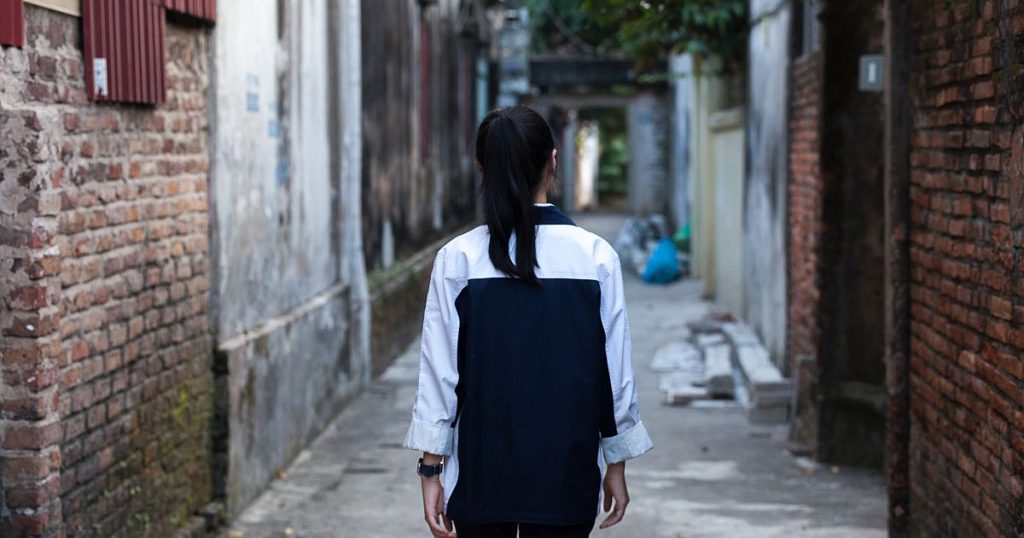© Plan International / Nick Kinloch
Sexual harassment has received more attention in recent years. But the problem persists, especially for urban girls and young women. They are harassed on a daily basis and often have to accept the situation – although they do have the right to free and safe access to public spaces. The only way to really solve this problem is to do something about it with the whole community. In Vietnam we are showing that it is possible, writes Tho Dao Thi Bao, project coordinator at Plan International Vietnam.
DrThe Vietnamese government, in conjunction with the United Nations, organized an investigation into violence against women in 2019. It has shown that more than 62% of Vietnamese women have already experienced physical, emotional or sexual violence in their lifetime. Young women and girls are the hardest hit, especially when it comes to sexual harassment on the street.
In Hanoi, the capital of Vietnam, public transportation is a surprising source of frustration. “For many girls, buses are the only transportation option in Hanoi. At the same time, it is also a major curb on my freedom of movement,” says Anh, the 21-year-old student.CatcallingAnd unwanted touches and stalking are just a few examples of what I experience on the bus every day. Despite previous efforts to address sexual harassment, many challenges remain.
That is why Plan International Vietnam launched it in 2014 Safer cities for girls Program in two districts of Hanoi. This way we wanted to increase the safety and independent mobility of girls in the city. The participation of girls and young women in decision-making is also crucial: city managers and policymakers must Listen For their recommendations.
Collective problem
Dealing with sexual harassment is difficult because the problem has many layers. First of all, there is no clear definition of sexual harassment in Vietnam. Everyone has a different definition and the impact on the victim and society as a whole is estimated differently. Because sexual harassment is difficult to quantify, it is unlikely that the incident will be reported to the police.
“Flower to pick, girl to tease”
The second challenge is not to punish the perpetrators. When sexual harassment is reported, it is extremely difficult to gather sufficient evidence. Even the perpetrators actively oppose bystanders who want to help. “When sexual harassment happens on our bus, all we can do is ask the perpetrator to get off,” said Mr. Thanh, a 45-year-old bus driver from Hanoi. “We are not the police and some perpetrators take revenge by calling our company and complaining about our services.” Therefore, many bus and transport drivers refused to take any action for fear of retaliation.
The third and more complex challenge is to address common gender inequality attitudes and cultural implications in Vietnam. For example, there is a double standard on acceptable behavior: Men can harass women without being criticized and blame the women themselves. “A flower should be picked, a girl provokes you” is a Vietnamese saying that perfectly describes how young women should accept this behavior.
These challenges show that there are many obstacles to addressing sexual harassment. To fix this, we need the community In its entirety Participation and reference to their responsibility. Teamwork on various challenges is the only way forward.
Empowering girls
He. She Safer cities The program addresses gender inequality with an emphasis on engaging the entire community. In cooperation with local partners, we want to denounce harmful social norms. Therefore, we cooperate with local bus companies to help train their drivers and employees. This way, they learn how to respond to sexual harassment. We also work with schools to better integrate gender equality into the curriculum.
We also support girls themselves and ensure they can defend themselves. Before that, we helped create inclusive and safe community spaces. We have also created something called Champions of Change Groups in which both girls and boys work together against sexual harassment. “We have already launched several campaigns about the safety of girls on the bus,” Anh says. “We carried out safety risk assessments at 80 bus stops in Hanoi, and subsequently shared our recommendations with the city government.”
Everywhere, in one way or another, free and safe access to public spaces for girls is restricted.
So far the results are very promising. Plan International has helped train more than 1,800 bus employees and educated more than 1,500 teachers and managers how to deal with gender equality in the classroom. along with Champions of Change And bus companies, we also designed a code of conduct for public transport employees and passengers.
This issue is really starting to appear throughout Vietnamese society. There are more and more initiatives that I find inspiring in our program. A prominent publisher has changed his textbooks recently. They saw us Safer cities Then they decided to present more comprehensive books that take gender equality into account.
So the Vietnamese government decided on us Safer cities At the core of their strategy against gender-based violence. Partly because of this success, Plan International decided to expand the project to other areas in Hanoi.
In recent years it has developed Safer cities Towards an international program. It is now organized in more than 15 cities from Lima and Kampala to Delhi. We are also active in Belgian cities such as Brussels, Antwerp, Ghent and Charleroi. The overall goals are the same, but will be adapted to meet the specific challenges of girls and young women in each city. In Hanoi, this translated into an emphasis on public transportation.
By addressing sexual harassment in different cities at the same time, we can suddenly agitate so many politicians and countries as a whole to take action.
However, it is precisely the universality of the problem that is so surprising: everywhere, in one way or another, free and safe access to public places for girls is limited. The challenges in Vietnam are often the same as those in other countries. Globally, there is a need for society as a whole to end sexual harassment. It does not matter “level of development” or degree of urbanization.
Once again, collaboration is the only way to stop this problem. Internationally, Plan International works with other civil society organizations to address sexual harassment with the United Forces. The Global Alliance for Children and Cities for example. Plan International is one of the founding members and Safer cities The program is proving to be an interesting source of inspiration for all participating organizations, including UNICEF and Save the Children.
By addressing sexual harassment in different cities at the same time, we can suddenly agitate so many politicians and countries as a whole to take action. Thanks to partnerships and shared expertise, we can increase pressure on local and national governments. In this way, they are more likely to listen to our demands and implement our recommendations. This, in turn, increases the opportunity to engage the entire community and thus address sexual harassment on the basis of merit.
Stay informed
Subscribe to our newsletters and stay up-to-date with global news
Finally, with Plan International, we hope to increase your reach and reach Safer cities To rise. Our current goal is to implement it globally in more than 20 cities and increase our influence within those cities. By working with more people, we can achieve more. People are at the center of our program: sexual harassment is a reality for many people, and girls and young women are at the forefront. At the same time it is too Mentality Of the people we need to change. And we can only do that by working together.
About the Author: Thu Dao Thi Bao is the Project Coordinator for Plan International Vietnam. She has been a part of the “Safer Cities for Girls” program since its inception in 2014. Khamis has more than 17 years of experience with child protection and gender-based violence projects.

“Coffee buff. Twitter fanatic. Tv practitioner. Social media advocate. Pop culture ninja.”













More Stories
“Ask at least one question in return.”
According to research, people with this sleep rhythm live longer.
13 municipalities in the province of Seville have mosquitoes carrying the Nile virus